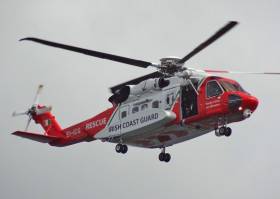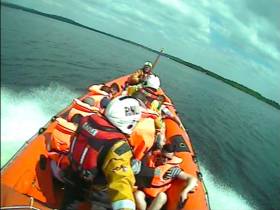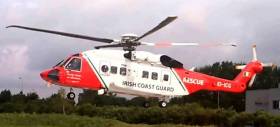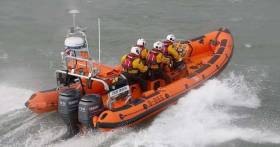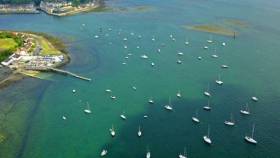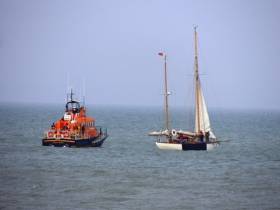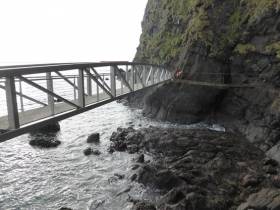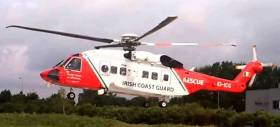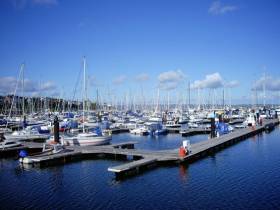Displaying items by tag: Rescue
Man Airlifted To Hospital After Lahinch Cliff Fall
#CliffFall - Independent.ie reports that a 23-year-old man was airlifted to hospital after falling 40ft into the sea from a cliff near Lahinch early this morning (Sunday 5 June).
Shannon's Irish Coast Guard helicopter Rescue 115 launched to the scene after the Doolin coastguard unit had difficulty recovering the man from the sea.
It's understood that the casualty was with friends at the cliff top around 5am when he fell and lost consciousness in the water.
At 1.45pm today, Lough Derg RNLI Lifeboat was requested to launch by Valentia Coast Guard, following a request for assistance from a cruiser with 9 people on board, which had grounded on rocks by Ryan's Point.
The lifeboat, with helm Eleanor Hooker, Dom Sharkey and Owen Cavanagh on board, launched at 2pm. Winds were westerly, Force 1/2, visibility was good.
At 2.10pm the lifeboat located the 40ft. vessel by Ryan's Point, inside the Mountaineer navigation mark.
An RNLI volunteer boarded the vessel and reassured everyone, all safe and unharmed, and asked them to put on their lifejackets. The RNLI crew member checked under the floorboards for any damage to the hull and found it intact. He put the ballast tanks on drain and carried out a visual survey of the rocks around the boat.
Meanwhile the lifeboat carried our soundings to determine depths and dangers close to the location. The lifeboat attempted to take the vessel off the shelf from its stern and from the bow, but she was stuck fast. At 3.02pm the lifeboat informed the Coast Guard that it was taking all 9 people and her RNLI crew member onto the lifeboat and transferring the casualties to Dromineer, where they would wait whilst, Lifeboat Operations Manage, Liam Maloney made arrangements for their boat to be re-floated.
On their return passage to Dromineer, the lifeboat had to advise another vessel that they would run aground if they held their course and did not round the Mountaineer Buoy. That vessel changed course and came back out onto the navigation channel.
The lifeboat returned to Station and was ready for service again at 3.40pm.
Lifeboat Operations Manager, Liam Maloney advises all boat users to 'stay within the navigation channels on the lake, and to study your charts before setting out from port'. 'This fine weather is to stay with us a while longer', he continued, 'remember to respect the water and think safety when in or around water'.
Coastguard Rescue For Cruiser Couple On Lough Derg
#Coastguard - Two people on board a 30ft cruiser were rescued by the Irish Coast Guard's Killaloe unit yesterday evening (Monday 23 May), as the Irish Examiner reports.
The coastguard team towed the boat into deeper water after it ran aground on Lough Derg before 6pm - and an ROV was used to confirm there was no damage to the underside of the vessel.
Skerries RNLI responded this afternoont to reports of swimmers in difficulty off a local swimming area known as The Springers.
The pagers sounded shortly before midday after Dublin Coast Guard received reports that a number of swimmers were caught in a rip current and were unable to get back to shore.
Skerries RNLI volunteers launched the lifeboat with David Knight at the Helm and crewed by Philip Ferguson, Emma Wilson and AJ Hughes.
Arriving on scene the crew discovered that there were four casualties in the water spread over a large area in between Red Island headland and Colt Island. The lifeboat quickly began recovering the casualties into the lifeboat.
With a large sea swell running and the casualties suffering from fatigue and early symptoms of hypothermia, it was necessary for one of the Skerries RNLI volunteers, Philip Ferguson to enter the water to assist them in getting on board.
Once all the casualties were on board the lifeboat returned to the station and recovered immediately to the warmth of the boathouse. Once inside the boathouse the casualties were assessed, monitored and treated for mild hypothermia but were all fit and well leaving the station.
Skerries Coast Guard unit and the Coast Guard helicopter Rescue 116 were also tasked. The helicopter stood by while the lifeboat recovered the casualties from the water.
Speaking after the call out, Gerry Canning, Volunteer Lifeboat Press Officer for Skerries RNLI said: ‘Rip currents are a major cause of accidental drowning on beaches across the world. Even if you know an area well, the currents may change based on the weather and tides. The speed of response is crucial in cases like this and our volunteers did an excellent job in getting there as safely and quickly as possible. ’
Two people were rescued from the water earlier this evening in Killyleagh, Strangford Lough, Northern Ireland after falling overboard from a dinghy.
A member of the public made a 999 call to the UK Coastguard at 7.00pm to report that they could hear shouts for help coming from the water at Killyleagh. Portaferry Coastguard Rescue Team and the Portaferry RNLI Lifeboat made their way to the incident.
Only minutes before the RNLI arrived, the Killyleagh Yacht Club Rescue boat reached the scene and found two people in the water. One person had fallen from the dinghy and was found clinging to the stern of moored vessel and the other person was clinging to a dinghy that was drifting out to sea.
The two casualties were taken to the Killyleagh Yacht Club, where one was treated for hypothermia by the Northern Ireland Ambulance Service.
Arklow & Bangor Lifeboats Have Busy May Day Weekend
#RNLI - Lifeboats from Arklow and Bangor were out on the water for separate callouts on May Day yesterday in what made for a busy weekend for the RNLI crews.
In Arklow, RNLI lifeboat volunteers were alerted by pager around 7pm on a fine Sunday evening (1 May) to a call for help from a vintage sailing vessel.
The lifeboat Ger Tigchleaar was launched within minutes to the classic boat, which has suffered engine failure and was stranded just east of Arklow Harbour.
The Arklow RNLI volunteer crew established a tow line and proceeded to tow the vessel safely back into Arklow. The five experienced crew members on the casualty vessel remained aboard during the tow home and all hands came ashore safely at Arklow.
Speaking after the incident, volunteer lifeboat press officer and community safety officer Mark Corcoran said: "On this, the RNLI’s Mayday fundraising weekend, our fundraising team and boats crew have been busy with all kinds of fundraising events.
"Even after a long day of fundraising our dedicated volunteers turned up this evening en masse to go to the aid of the crew of this stricken vessel.
"We’re all very proud to be involved with the RNLI, so please give generously to the Mayday campaign to help keep us doing what we do, which is saving lives at sea."
Elsewhere on the same evening, Bangor RNLI’s volunteer lifeboat crew launched to the aid of a RIB with engine failure just off Royal North Yacht Club in Belfast Lough.
Although not in immediate danger, a strong breeze was blowing the vessel, with one person on board, offshore. Thankfully the Bangor inshore lifeboat was able to tow the RIB in to Royal North without incident.
Bangor RNLI volunteer helmsman Gareth Whan said: “The crew and I are delighted to have been able to return this vessel safely to shore. Engine failure can happen in the best-maintained boat, and we are pleased to have been able to help.”
This was Bangor RNLI’s second callout of the weekend. On Friday evening (29 April) they were asked by Belfast Coastguard to assist Lagan Search and Rescue and other emergency services in a detailed search of Belfast Harbour for a person in the water.
Sadly, this callout did not have a happy ending. The search was called off after three hours, and resumed on Saturday morning. However, it was only yesterday (Sunday 1 May) when a body was found by police divers.
Bangor RNLI extended its sympathies to the family of the man and all involved in the attempted rescue.
“It is sadly appropriate that both of these launches happened during the May Day weekend, a key fundraising time for the RNLI, and highlight the importance of the work our volunteers do,” said Bangor's deputy launching authority Bryan Lawther.
NI Coastguard Teams In Gobbins Cliff Rescue Exercise
#Coastguard - Northern Ireland coastguard teams have taken part in a major rescue exercise The Gobbins in Co Antrim ahead of the cliff path's reopening this May Day weekend, as the Belfast Telegraph reports.
As many as 50 volunteers from Kilkeel, Newcastle, Ballycastle, Coleraine and Portmuck carried out various cliff rescue exercises, including a mock evacuation of multiple casualties.
The path has undergone a number repairs after significant storm damage forced its closure in December, just months after the 'white-knuckle' attraction welcomed its first visitors since the 1950s.
The Belfast Telegraph has more on the story HERE.
Lobsterman Winched To Safety By Sligo Coastguard Helicopter After Getting Caught In Own Ropes
#Rescue - A lobster fisherman was rescued after getting tangled in his vessel's ropes when it overturned off the Donegal coast on Saturday evening (9 April).
As TheJournal.ie reports, the rescue of the solo fisherman proved difficult for local coastguard and lifeboat teams due to the heavy swell at Inishinny, off Arranmore Island.
That's when the Sligo-based Irish Coast Guard helicopter Rescue 118 came in to free the man from his vessel and winch him to safety.
Rescue 118 was later called out to rescue a number of surfers in difficulty of the Leitrim coast, as previously reported on Afloat.ie.
Bangor Marina Onlookers Fail To Help Drowning Man
#Rescue - Belfast Coastguard was "stuck for words" after bystanders failed to raise the alarm for an elderly man who fell into the water at Bangor Marina this week.
According to the Belfast Telegraph, the man was working on his boat at the marina on Belfast Lough when he slipped into the water just after 11am on Thursday morning (31 March).
He was reportedly moments away from drowning before he was rescued by Graham Edgar, who described a group of onlookers at the marina who failed to call for help, or even throw in one of a number of lifesaving devices nearby.
The Belfast Telegraph has more on the story HERE.
Coastguard Helicopter In Trawler Medevac Off Carlingford
#Coastguard - Dublin's Irish Coast Guard helicopter was involved in a rescue off the north-east of Ireland early this morning (Tuesday 16 February), as Independent.ie reports.
Rescue 116 assisted Belfast Coastguard in the medevac of a fisherman who suffered head injuries on a trawler 25 miles off Carlingford, Co Louth.
The man was airlifted to Daisy Hill Hospital in Newry where his condition is not yet confirmed.



























